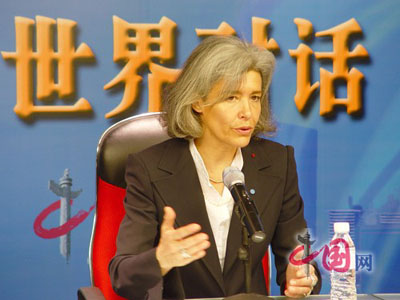| Tools: Save | Print | E-mail | Most Read |
| China May Contribute to International Space Station: Expert |
| Adjust font size: |
The 16th IAA Human in Space Symposium, held in Beijing May 21-24, was attended by specialists from around the world. China.org.cn had a special interview Thursday with France's first female astronaut Claudie Haignere, former minister for research and new technologies and a space medical expert.
Ms. Haignere trained as a doctor, specializing in arthritis, and has conducted a large volume of research in the field of life sciences. She traveled to space in 1996 and 2001, where she studied neurology in the international space station, getting to know how the brain reacts to the environment in space. She is now working for the European Space Agency, focusing on making astronavigation-related policies for Europe and the world. Ms. Haignere had the opportunity to speak with Chinese astronaut Yang Liwei after Yang returned from space in 2003, marking the first direct talk between the West and Chinese astronauts. Referring to construction of the international space station, Ms. Haignere explained that this plan became an international initiative in 2000 with the United States, Russia, Japan and Canada as the cooperative partners. The space station is composed of modules, operating in low orbit, only 400 km away from the earth. Construction of the space station is expected to reach completion in 2010. China has not taken part in the construction, but they have made a step forward to building a small-scale space station in the future, even though their space program is young, Ms. Haignere said. "Now we are considering a possibility of cooperation between the international space station and China in low orbit. China's development in space sciences and the international space station are both fields for international cooperation in space which will improve the work to realize the landing on the moon again and visiting Mars around 2050." Regarding the plan put forward by Yang Liwei to establish a standard for spacecraft docking, Ms. Haignere said the suggestion is completely reasonable. It is possible that more and more countries will start exploration in outer space within 5 to 10 years. At that time materials in space such as launchers and modules should be available for use by the entire international community. Some administrative staff in the European Space Agency is making policies to encourage the establishment of such a standard, but that is not enough. Astronauts, scientists and engineers should work together to provide suggestions for the policy makers, said Ms. Haignere. "Although we don't speak a same language, I found during the symposium of this time that all the astronauts and scientists have one wish which is to advance human beings' exploration undertakings. A lot of our ideas are very similar, so I believe we could work together in the near future." (China.org.cn by Zhang Tingting, May 26, 2007) |
| Tools: Save | Print | E-mail | Most Read |
 |
| Related Stories |
|
Product Directory China Search |
Country Search Hot Buys |
